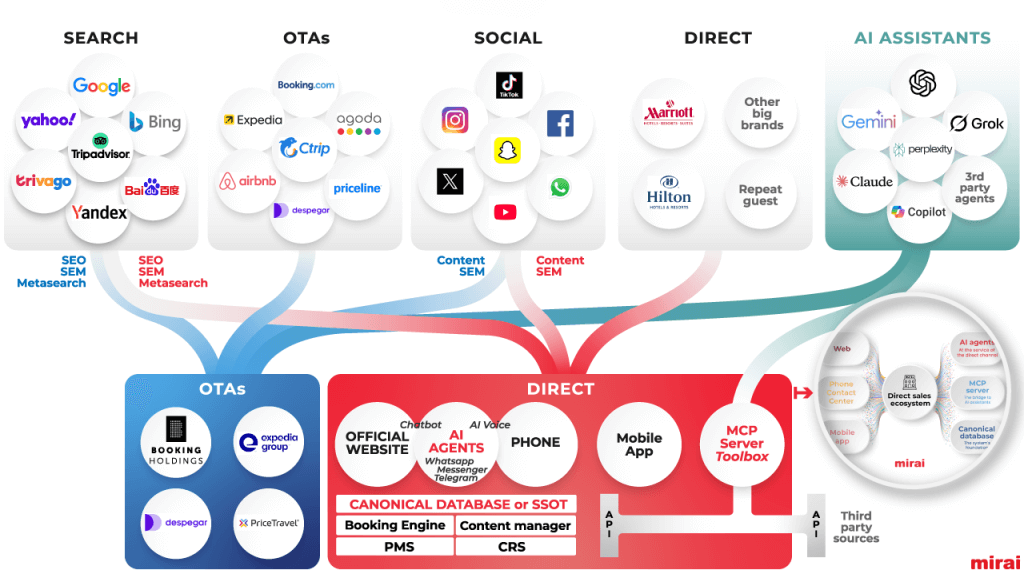
Whether you have a dedicated marketing team or you’re a small team wearing many hats, you need good analytics.
NB: This is an article from Fuel
There is really no point in marketing if you’re not tracking those efforts. Reliable reporting makes the most of your marketing budget. Understanding your marketing ROI increases revenue overall. Most hotel marketers – or whoever at your property is taking on this task – wear many hats and have many interfaces to check on a daily basis.
Subscribe to our weekly newsletter and stay up to date
That’s why we recommend consolidated marketing reports that bring together e-commerce and marketing data to a single dashboard. Fewer logins, and more time to craft marketing campaigns that drive revenue.

Marketing reports aggregate data from many resources, including but not limited to your:
- Website (traffic)
- Third-party reviews
- Email marketing
- Conversions and booking mix
A consolidated reporting tool aggregates marketing data for your hotel so that, depending on your capacity and needs, you can track marketing regularly. You should be checking in on your hotel website, reviews, and proactive marketing efforts on a routine basis.
To make informed, strategic decisions, you should be analyzing your marketing performance on key channels. Let’s break down what a hotel marketing report absolutely must include.
WEBSITE – TRAFFIC AND SEARCH
Your hotel website should be central to your hotel’s digital marketing strategy. Even when guests don’t book direct, they will check your website to validate their decision. Tracking website performance tells you how many visitors you’re receiving and how engaged they are with your site. Some key website metrics:
- Unique visits – the number of unique (e.g., not counting repeat or return) visitors to your site
- Bounce rate — the percentage of visitors leaving your site after one page or a brief visit; you want this number to be low!
- Average time on site – a measurement of how long visitors are spending on your site overall
- Page views per visit – how many individual pages each visitor views, on average
The above metrics will give you insight into how your website is performing. We also recommend monitoring how you’re doing driving visitors to your site.
The majority of your traffic will come through search engines such as Google. So, you should also be tracking search performance. This includes the number of times your property shows up in searches—and how often people click through to the site. Another important metric to monitor is your keywords. Your branded keywords, such as your full hotel name, should always direct people to your website, rather than an OTA who is also trying to get traffic for the same term!
THIRD-PARTY REVIEWS AND ONLINE REPUTATION
Another key facet of your digital marketing is your presence on indirect channels. This includes OTAs like TripAdvisor, review sites like Yelp or Google, as well as social media. You should be monitoring your performance on these sites in two ways: one, the bookings they generate (which we’ll discuss below) as well as your reputation on them.
Track and monitor online reviews on multiple channels through a single panel. All these third-party sites present the information differently, so a single interface makes this process easy. Some general areas to monitor on OTAs and review sites:
- Recent reviews – monitoring reviews so you can reply to negative ones ASAP, you also want to make sure you have a steady stream of recent reviews for prospective guests
- Overall score – track your rating on sites to see if a specific site needs your attention
OTAs affect your online reputation while also generating revenue. Social media may not generate revenue, but you should still be keeping an eye on it. Even if you’re not actively posting new content as regularly as you’d like, potential guests will be looking at your social media to get a sense of your property! Key social metrics include:
- Number of followers or likes
- Number of check-ins (especially relevant for Facebook)
As with anything, there are a lot more metrics you can measure with social media. But tracking these general numbers will give you an overview of how you’re doing without getting lost in minutia!
EMAIL MARKETING
After your website, email marketing is one of the most important drivers of direct revenue. You should be tracking both your regular emails (confirmations, pre- and post-stay emails, all the emails you send automatically around a booking) as well as dedicated email marketing campaigns.
Measure your email marketing performance by comparing:
- Total sent – the total number of unique emails you sent out
- Delivered – the number of sent emails that successfully reached an inbox
- Opened – the delivered emails that were opened
- Clicked – the number of people who opened the email and clicked a link within
- Clickthrough rate – the percentage of clicks vs sends; the measurement of how effective an email campaign was at getting people to engage with you and potentially book
These numbers will let you see which email campaigns are effective and which ones you may need to work on.
CONVERSIONS AND BOOKINGS
The goal of all your marketing efforts is, of course, to increase revenue. Some marketing may be tied to brand awareness, but most of your marketing campaigns can and should be tied to real revenue goals. Of course, revenue reporting alone is its own domain. But your marketing reports must display how your marketing is turning into dollars.
A consolidated report will show you your holistic website performance. That means traffic (as mentioned above) pulled from website analytics, but also how that traffic turns into revenue, drawn from your booking engine. Measure website conversions through key metrics like total revenue from the site (overall and by dates), as well as average revenue per stay and average length of stay.
Measure this alongside data drawn from your CRS and PMS to see revenue performance across channels. Including revenue in your consolidating marketing reports allows you to directly track the impact of any one area against another.
CONSOLIDATED DATA
We’ve covered a lot of different data points in this article—and there’s more out there. Any other marketing ventures, such as a mobile app or paid advertising must also be measured. The key value of a marketing report is that it brings in data from many sources into one easily-analyzed source.
In this article we’ve discussed nearly a dozen different data sources, from your website, booking engine, CRS, social media sites, review sites, email marketing platform, and so on. Even the most dedicated marketer does not have the time to log in to all these places and check them with any frequency.




